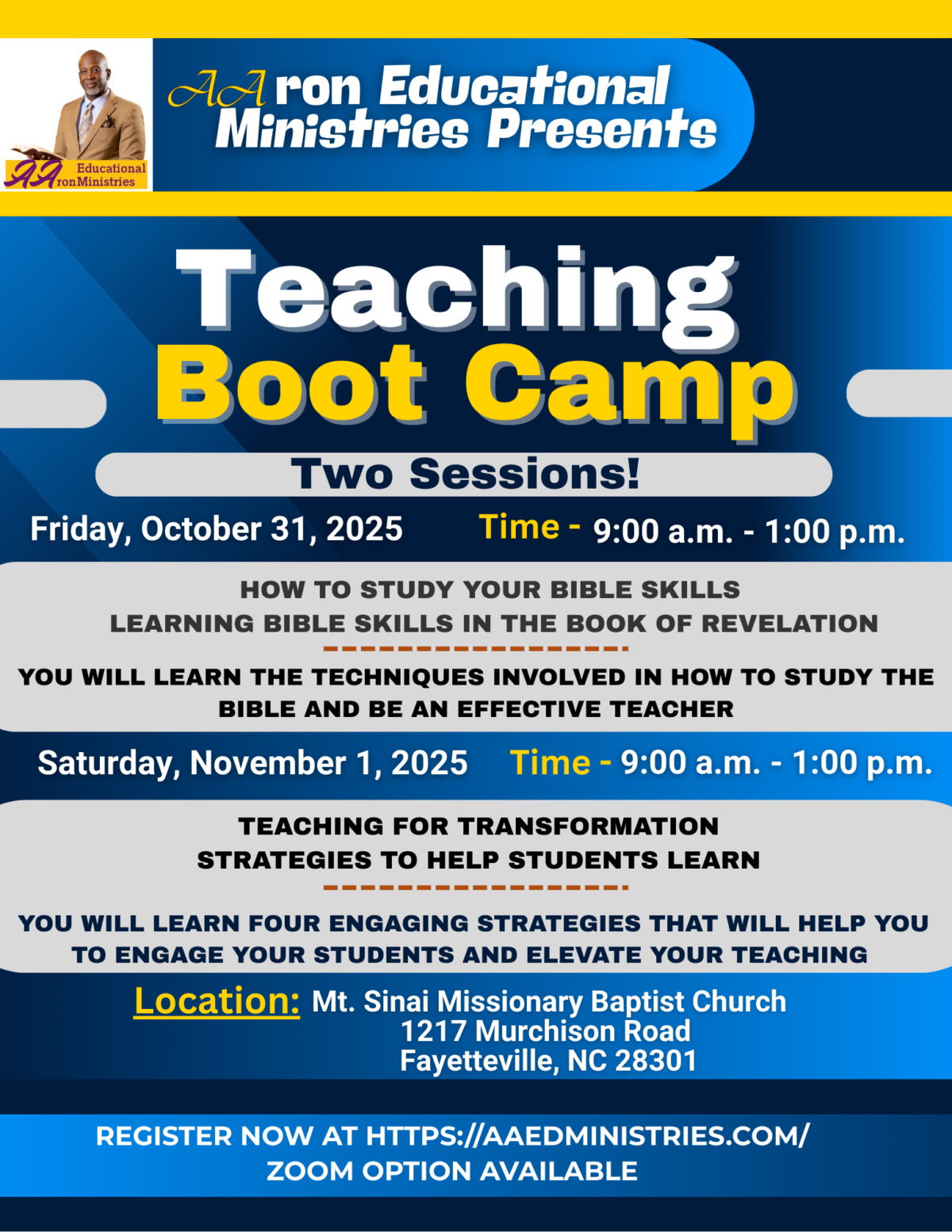Fayetteville, NC – September 16, 2025 – AAron Educational Ministries is pleased to announce its upcoming Educational Teaching Boot Camp, a dynamic two-day event designed to empower teachers, leaders, and Bible students with practical skills and transformative strategies for effective Christian education. The sessions will be held at Mt. Sinai Missionary Baptist Church, 1217 Murchison Road, Fayetteville, NC, on Friday, October 31, 2025, from 9:00 a.m. to 1:00 p.m. and Saturday, November 1, 2025, from 9:00 a.m. to 1:00 p.m..
In response to the growing need for deeper understanding and stronger communication in faith-based learning, the boot camp offers interactive workshops that combine biblical study with teaching excellence. Attendees will gain actionable tools to enrich their teaching ministries while enhancing their ability to engage students in meaningful, lasting ways.
Workshop Highlights
The two-day event features a lineup of workshops tailored for both seasoned leaders and aspiring educators:
- Friday, October 31 (9:00 a.m. – 1:00 p.m.)
- How to Study Your Bible Skills: Practical methods to approach Scripture with clarity, accuracy, and deeper insight.
- Learning Bible Skills in the Book of Revelation: Guidance on navigating one of the Bible’s most challenging and profound texts.
- Saturday, November 1 (9:00 a.m. – 1:00 p.m.)
- Teaching for Transformation: Developing lessons that not only inform but also inspire spiritual growth and life application.
- Engaging Strategies to Elevate Your Teaching: Modern techniques to increase student participation, improve retention, and foster interactive learning.
In-Person and Virtual Access
To make the boot camp accessible to a wider audience, participants may attend in person at Mt. Sinai Missionary Baptist Church or virtually via Zoom. This hybrid format ensures that teachers, preachers, and students across regions can join and benefit from the training regardless of location.
A Mission to Equip and Empower
AAron Educational Ministries has long been committed to equipping educators and ministry leaders with the knowledge and skills necessary to build stronger communities of faith. The Teaching Boot Camp reflects this mission by offering workshops that go beyond theory, emphasizing tools participants can immediately implement in their ministries, classrooms, or personal Bible studies.
“Our vision is to strengthen the foundation of Christian education by empowering those who teach,” said a spokesperson for AAron Educational Ministries. “This boot camp is more than a learning experience—it is an opportunity to sharpen teaching skills, deepen biblical understanding, and inspire transformation in the lives of students and congregations.”
Why Attend?
- Practical Learning – Gain hands-on strategies that can be applied immediately.
- Biblical Depth – Explore essential skills for studying Scripture, with a focus on Revelation.
- Transformative Teaching – Learn how to shift from delivering information to fostering life-changing encounters.
- Community Connection – Engage with fellow educators, preachers, and students who share a passion for teaching God’s Word.
- Flexible Participation – Choose between attending on-site in Fayetteville or virtually via Zoom.
Registration Information
Interested participants are encouraged to secure their place early. Registration is available online at https://aaedministries.com.
Event Details at a Glance
- Event: Educational Teaching Boot Camp
- Dates: Friday, October 31, 2025, and Saturday, November 1, 2025
- Time: 9:00 a.m. – 1:00 p.m. each day
- Location: Mt. Sinai Missionary Baptist Church, 1217 Murchison Road, Fayetteville, NC
- Virtual Access: Zoom option available for remote participants
- Registration: https://aaedministries.com
About AAron Educational Ministries
AAron Educational Ministries is dedicated to advancing Christian education through workshops, seminars, and resources designed to equip leaders, teachers, and students. By fostering biblical literacy and effective teaching practices, the ministry seeks to build stronger individuals, congregations, and communities rooted in faith.
Media Contact:
AAron Educational Ministries
Email: aaedministries@gmail.com
Website: https://aaedministries.com


